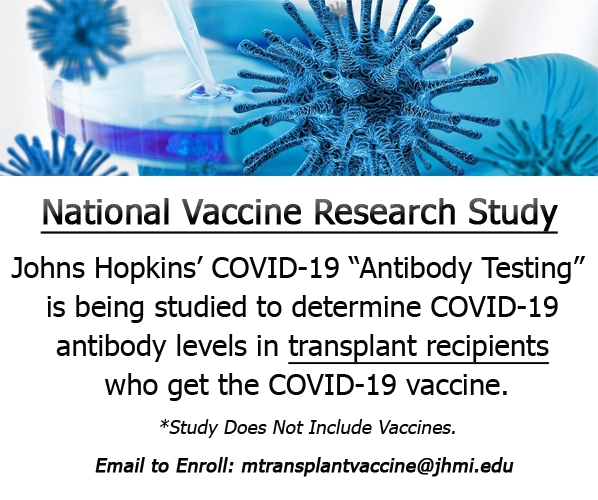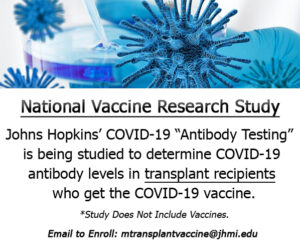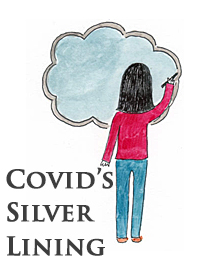
While Covid-19 vaccine (3rd dose) boosters are now recommended for immunosuppressed patients—here’s the back story as to why this population finds itself more vulnerable
Article From Science.org/news — 26 JUL 2021
Doctors recommend that organ transplant patients continue to take precautions such as wearing a mask and social distancing even after they are fully vaccinated.
Transplant physicians have worried for months that their patients might not be getting the protection they need from COVID-19 vaccines. Studies have already shown that many organ recipients don’t produce coronavirus-fighting antibodies even after two doses of the highly effective messenger RNA (mRNA) vaccines—an indication their bodies are unable to mount a strong defense against SARS-CoV-2. A study out today indicates this lack of antibodies is indeed translating to a much higher risk of “breakthrough” cases of COVID-19 among vaccinated transplant recipients.
Immunosuppressant drugs, commonly used to keep the body from rejecting a new organ, leave transplant patients more vulnerable to infections. In a previous study involving 658 transplant recipients, just 54% of patients given two doses of an mRNA vaccine developed antibodies to protect them against the pandemic coronavirus. But antibodies are only one indication of a body’s response to a vaccine. Low antibody levels are “a warning,” says Dorry Segev, a transplant surgeon with Johns Hopkins University. “It’s a signal, but it doesn’t necessarily mean that they have suboptimal protection.”
To measure that protection, he and colleagues obtained SARS-CoV-2 infection and testing data on more than 18,000 fully vaccinated recipients of large organs like kidneys or lungs at 17 transplant centers across the United States. They found that 151 of these patients caught the virus. Of those that became infected, more than half were hospitalized with COVID-19 symptoms and nearly one in 10 died.
Although the rate of infection in the study was low, just 0.83%, it’s still 82 times higher than in the general vaccinated public—and the rate of serious illness was 485 times higher, the team reports today in Transplantation. This study provides the first clinical evidence across multiple hospitals that transplant recipients are less protected by the vaccine, Segev says.
Eva Schrezenmeier, a nephrologist at Charité University Hospital in Berlin, worries the study is actually underestimating breakthrough cases, because the patients might have gone to different hospitals to be treated for COVID-19, or might not have reported their breakthrough case at all. “I think they might have missed some patients.”
Deepali Kumar, a transplant infectious disease physician at University Health Network in Toronto, says this is a “welcome study,” but she would like to know more about those who had breakthrough infections before drawing any conclusions. Because the study is based on summary data and not complete medical records, it can’t provide information about whether the serious breakthrough cases were in older organ recipients, or in patients who received a particular kind of transplant, she says. “There are a lot of questions remaining.”
One thing is certain, however: “We need to do a lot more to protect our transplant patients,” she says.
A potential solution: a third shot of vaccine. Kumar, Segev, and other researchers are studying whether a booster dose could give transplant recipients better COVID-19 protection.
Two recently published studies have shown promising results. In the first, published last month in The New England Journal of Medicine, 68% of organ recipients produced antibodies after a third dose of the mRNA vaccine made by Pfizer, up from 40% after two doses. In another study published last week in JAMA, doctors administered a third dose of Moderna’s mRNA vaccine to 159 kidney transplant patients who generated little to no antibodies after two doses. They found that 49% of these patients subsequently started to churn out antibodies.
Third doses are not yet an officially recommended course of action for immunocompromised people in most countries, but as more data come out, policies are shifting. The French government endorsed third doses for transplant patients in April. The United Kingdom’s National Health Service also plans to begin to offer a third vaccine dose to immunocompromised individuals beginning this fall. In the United States, an advisory panel for the Centers for Disease Control and Prevention last week evaluated recommending third doses, but likely won’t make an official recommendation until after the Food and Drug Administration offers full approval to the mRNA vaccines. [Update: FDA has approved and boosters are now recommended]
In the meantime, transplant patients should still get their COVID-19 vaccine, Segev says, because limited protection is better than none. But they should also continue to wear masks and practice social distancing, he stresses. Getting the rest of the population vaccinated is another crucial step in helping protect these patients, he adds. “This is a stark clinical reminder that transplant patients are inadequately protected by the standard vaccine series.”
Article Taken From July 26, 2021 Science.org — News



 A new study for COVID-19 vaccine antibody testing is being led by the transplant team at Johns Hopkins.
A new study for COVID-19 vaccine antibody testing is being led by the transplant team at Johns Hopkins. 